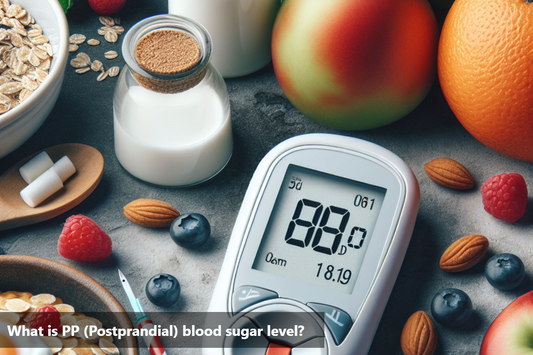Diabetes protein powder can be a valuable addition to the diet of individuals with diabetes. This specialized supplement is designed to provide essential nutrients while helping to manage blood sugar levels and support overall health. By combining the benefits of protein with ingredients tailored for diabetes management, this powder offers a convenient and effective way to meet nutritional needs.
What is Diabetes Protein Powder?
-
Diabetes protein powder is specially formulated for individuals managing diabetes, aiming to provide added benefits beyond standard protein supplements. Unlike regular protein powders, diabetes protein powder is tailored to support blood sugar management and overall health for those with diabetes.
-
The ingredients in diabetes protein powder are carefully selected to promote stable blood sugar levels while offering essential nutrients necessary for the body. These typically include high-quality proteins, such as whey or plant-based proteins, along with added fiber and minimal sugar content compared to regular protein powders.
-
One key difference between diabetes protein powder and regular protein powders lies in their impact on blood sugar. Diabetes protein powder is designed to prevent spikes in blood glucose levels, making it a safer option for individuals with diabetes.
-
Understanding the distinct needs of diabetics, diabetes protein powder focuses on providing optimal nutrition to support muscle growth, weight management, and overall well-being while maintaining blood sugar control.
Diabetes and Protein
The relationship between diabetes and protein is crucial, as protein intake plays a significant role in managing blood sugar levels, supporting muscle health, and overall well-being for individuals with diabetes. Unlike carbohydrates, protein has a minimal impact on blood glucose levels, making it an essential component of diabetic diets. Protein-rich foods help to stabilize blood sugar levels by slowing down the absorption of glucose into the bloodstream, reducing the risk of hyperglycemia and hypoglycemia. Additionally, protein is vital for maintaining muscle mass and strength, which is particularly important for individuals with diabetes, as the condition can lead to muscle wasting if blood sugar levels are poorly controlled. Therefore, including lean sources of protein, such as poultry, fish, legumes, and tofu, in the diet can help individuals with diabetes manage their condition effectively and improve their overall health outcomes.
However, it's essential for individuals with diabetes to be mindful of their protein choices and portion sizes. Some protein-rich foods, such as fatty cuts of meat or processed meats, may also contain high levels of saturated fats and sodium, which can increase the risk of heart disease and other complications associated with diabetes. Opting for lean sources of protein, such as poultry, fish, legumes, tofu, and low-fat dairy products, can help individuals with diabetes meet their protein needs while promoting overall health.
Moreover, protein should be consumed as part of a balanced diet that includes a variety of nutrient-rich foods, including fruits, vegetables, whole grains, and healthy fats. Monitoring portion sizes and spreading protein intake evenly throughout the day can also help individuals with diabetes manage blood sugar levels effectively.
How does Protein Powder help in Diabetics Management?
-
Blood Sugar Management: Protein has a minimal impact on blood sugar levels compared to carbohydrates. Including protein in meals and snacks can help stabilize blood sugar levels and prevent sharp spikes and crashes, which is crucial for managing diabetes.
-
Muscle Health: Diabetes can lead to muscle loss, especially if blood sugar levels are poorly controlled. Adequate protein intake is essential for preserving muscle mass and strength. Protein supplements can help individuals with diabetes meet their protein needs, particularly if they have difficulty consuming enough protein through whole foods alone.
-
Weight Management: Protein is known for its ability to promote satiety and reduce appetite. Including protein-rich foods or supplements in the diet can help individuals with diabetes feel fuller for longer, which may aid in weight management or weight loss efforts. Maintaining a healthy weight is important for managing diabetes and reducing the risk of complications.
-
Wound Healing: Diabetes can impair wound healing and increase the risk of infections. Protein is necessary for tissue repair and regeneration, including the healing of wounds. Protein supplements may support wound healing and recovery in individuals with diabetes, particularly those with chronic wounds or foot ulcers.
-
Nutrient Absorption: Some individuals with diabetes may have digestive issues or malabsorption problems, leading to nutrient deficiencies. Protein supplements can provide easily digestible and absorbable protein, ensuring adequate nutrient intake even in cases of digestive dysfunction.
-
Convenience: Protein supplements offer a convenient and portable source of high-quality protein that can be easily incorporated into meals and snacks. This convenience is particularly beneficial for individuals with busy lifestyles or those who have difficulty preparing or consuming protein-rich foods.
-
Heart Health: Protein-rich foods, such as lean meats, poultry, fish, nuts, and legumes, are also sources of heart-healthy nutrients like omega-3 fatty acids, fiber, and antioxidants. Including these foods in the diet can help improve cardiovascular health and reduce the risk of heart disease, which is a common complication of diabetes.
Ways to Incorporte Protein Powder in Diabetic Diet
Individuals with diabetes can include protein powder in their diet in various ways while considering their dietary preferences, blood sugar management, and overall nutritional needs. Here are some suggestions for incorporating protein powder into the diet for individuals with diabetes:
-
In Smoothies: Blend protein powder with low-sugar fruits (such as berries), leafy greens (like spinach or kale), and unsweetened almond milk or Greek yogurt for a nutritious and filling smoothie. Avoid adding high-sugar fruits or sweetened beverages to keep the sugar content low.
-
In Oatmeal or Yogurt: Stir protein powder into cooked oatmeal or plain Greek yogurt to boost the protein content of these breakfast staples. Add toppings like nuts, seeds, or a sprinkle of cinnamon for added flavor and texture.
-
In Baked Goods: Use protein powder as a substitute for some of the flour in recipes for pancakes, muffins, or cookies. This can increase the protein content of baked goods while reducing the overall carbohydrate content. Opt for recipes that use whole grains and natural sweeteners instead of refined flour and sugar.
-
In Soups or Stews: Mix protein powder into soups or stews for added protein without significantly altering the taste or texture of the dish. Choose savory protein powders or unflavored varieties for this purpose.
-
In Energy Balls or Bars: Combine protein powder with nuts, seeds, nut butter, and a small amount of honey or dates to make homemade energy balls or bars. These snacks provide a convenient source of protein for on-the-go snacking.
-
As a Protein Shake: Mix protein powder with water, milk (dairy or plant-based), or unsweetened almond milk for a quick and easy protein shake. You can also add ice cubes, nut butter, cocoa powder, or spices like cinnamon or vanilla extract for flavor variations.
-
In Salad Dressings: Whisk protein powder into homemade salad dressings or marinades to add a protein boost to salads or grilled meats. Combine with olive oil, vinegar, herbs, and spices for a flavorful and nutritious dressing.
-
With Nutrient-Dense Foods: Pair protein powder with other nutrient-dense foods like fruits, vegetables, nuts, seeds, and whole grains to create balanced meals and snacks that support blood sugar control and overall health.
Bottomline
Diabetes protein powder is a crucial component in the wellness arsenal of individuals managing diabetes. By understanding the significance of incorporating this specialized supplement into daily routines, those with diabetes can experience a range of benefits that contribute to their overall health and well-being. Protein supplements tailored for individuals with diabetes offer a unique blend of nutrients, specifically formulated to support blood sugar management and muscle health. Unlike regular protein powders, diabetes-specific variants are designed to provide targeted support for individuals navigating the complexities of the condition..
This Blog post is an initiative by DiabeSmart, to provide accurate and Nutritionist / Doctor approved information related to Diabetes. DiabeSmart is India's first Food brand designed specifically for Diabetics, that has been clinically tested on Diabetics and Pre-Diabetics to deliver 55% - 70% lower Sugar spikes. DiabeSmart is part of Lo! Foods - India's leading brand for Everyday Functional Health foods.











